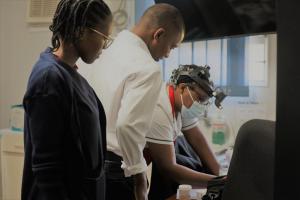Eswatini’s multi-pronged strategy to prevent cervical cancer saves lives
Mbabane—When Simangele Dlamini was diagnosed with a pre-cancerous cervical lesion, all the 50-year-old mother from Mankayane in Eswatini could think about was the welfare of her children. “My husband died in 2017 and I didn’t know who would raise them if I died of cancer,” she recalls.
Instead, Dlamini benefited from a multi-pronged strategy by the Government of Eswatini to curb cancers affecting women. Cervical cancer incidence in the country, at 84.5 per 100 000 women, is the highest in the world and compounded by the country’s high HIV burden.
Dlamini’s lesion was diagnosed thanks to Eswatini’s efforts to offer routine cervical cancer screening to women living with HIV for early detection. HIV-negative women are advised to do cervical cancer screening once every two years and HIV-positive women once a year, through the visual inspection using ascetic acid (VIA) method as the first line of screening. Had it not been for these provider-initiated screening services, Dlamini says she would still have no idea that she had a lesion that would have progressed to cervical cancer.
Dlamini’s lesion was removed using the highly effective Loop Electrosurgical Excision Procedure (LEEP), which has not been widely accessible in developing countries due to the need for trained staff to conduct the procedure, among other constraints.
Nokwethu Mkhumane, a midwifery nurse and one of Eswatini’s first nurses to receive LEEP training says her newly acquired skills are helping to increase access to the services for women who need it. Mkhumane was trained in 2023 at the University Teaching Hospital in Zambia through support from World Health Organization (WHO) and Bristol Myers Squibb Foundation.
“During my training, I conducted 20 LEEPs. I had initially thought this is simple procedure, but I realized that it is complicated and needs skill and attention,” says Mkhumane. “The training has sharpened my eyes and made me more vigilant when conducting the screening so that I don’t miss lesions,” says Mkhumane.
Furthermore, WHO deployed Dr Samson Chisele, a LEEP specialist from University Teaching Hospital in Zambia to Eswatini in 2023 to train 20 local practitioners to excise pre-cancerous lesions, a procedure which had previously only been available only at the Mbabane Government Hospital in the country’s capital.
“It is exciting to be able to help women. One thing that I like about cervical cancer screening is that it is something that you can do as a nurse from beginning to end, in that if you find something unusual, you are able to act in removing the lesion and leave the women healthy again,” says Mkhumane.
Following the training initiative, LEEP services have been decentralized from one hospital to six other facilities, including health centres, with plans to add one more centre. Access to treatment and care options for cancers affecting women, including cervical and breast cancers, improved further with the 2023 opening of the Manzini Oncology Hospital.
Vaccination against human papillomavirus (HPV) has added another layer of protection from cervical cancer for young girls in the country. WHO supported Eswatini to launch the first-ever HPV vaccination campaign in June 2023, which has so far reached 73% of girls aged between 9 and 14 years. The HPV vaccine can prevent most cases of cervical cancer if it is administered before girls or women are exposed to the virus.
WHO developed the vaccine introduction plan, micro planning, the development of health worker guidelines and monitoring tools, including a readiness assessment for HPV vaccine introduction and supportive supervision. WHO is also supporting the ministry to develop a costed 2024‒2030 National Cervical Cancer Elimination Action Plan. Eswatini’s Ministry of Health is committed to achieving the 90-70-90 Cervical Cancer Global targets by 2030, which puts the country on track to eliminating cervical cancer as a public health threat.
“Cancers affecting women have a devastating impact on the next generation, with children who lose their mothers to cancer experiencing health and educational disadvantages throughout their lives. As WHO, we are proud to have played such an important role in protecting and treating Eswatini’s women and girls, and keeping families whole,” says Dr Susan Tembo, WHO Representative in Eswatini.
Dlamini’s family is a case in point. “If my nurse had not offered the screening services, I would probably have found out about the lesion only when it was too late. I am so relieved to be out of danger and that my children still have a mother to take care of them,” she says.
WHO Communications Officer
Email: mavusow [at] who.int (mavusow[at]who[dot]int)
Tel: +26878020180
WhatsApp: +26876509256
Communications and marketing officer
Tel: + 242 06 520 65 65 (WhatsApp)
Email: boakyeagyemangc [at] who.int (boakyeagyemangc[at]who[dot]int)
